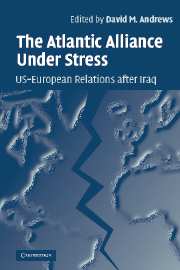Book contents
- Frontmatter
- Contents
- List of contributors
- Preface
- Introduction
- I The Iraq War and the Atlantic alliance
- II National policies within the Alliance
- 4 US politics and transatlantic relations: we are all Europeans now
- 5 Three rifts, two reconciliations: Franco-American relations during the Fifth Republic
- 6 Security exporters: Germany, the United States, and transatlantic cooperation
- 7 A bridge too far: the United Kingdom and the transatlantic relationship
- 8 The richest and farthest master is always best: US–Italian relations in historical perspective
- III Prospects for the Alliance
- References
- Index
7 - A bridge too far: the United Kingdom and the transatlantic relationship
Published online by Cambridge University Press: 22 September 2009
- Frontmatter
- Contents
- List of contributors
- Preface
- Introduction
- I The Iraq War and the Atlantic alliance
- II National policies within the Alliance
- 4 US politics and transatlantic relations: we are all Europeans now
- 5 Three rifts, two reconciliations: Franco-American relations during the Fifth Republic
- 6 Security exporters: Germany, the United States, and transatlantic cooperation
- 7 A bridge too far: the United Kingdom and the transatlantic relationship
- 8 The richest and farthest master is always best: US–Italian relations in historical perspective
- III Prospects for the Alliance
- References
- Index
Summary
For the past fifty years, British foreign policy has attempted to act as a “bridge” between continental European governments which (at least from the perspective of the British conventional wisdom) were parochial in their concerns, and US administrations which often forgot that their European allies had legitimately distinct interests. The end of the Cold War did not alter this stance. First John Major and then Tony Blair came into office declaring their intention to place Britain “at the heart of Europe” while also attempting to maintain what they saw as a “special relationship” with the United States.
Developments in the period from September 11, 2001, to the invasion of Iraq, and even more in the aftermath of that invasion, have severely shaken this concept of a special relationship and the whole idea of Britain as a bridge between Europe and the United States. The government – above all, Britain's strong-minded prime minister – gave strong support to American policy in Iraq; much of the prime minister's party, and a substantial segment of public opinion, equally strongly questioned the rationale for American preemption. The argument of this chapter is that Prime Minister Blair's firm support came more from his personal conviction that Saddam Hussein's regime was a threat to global security than from his commitment to transatlantic cooperation under all circumstances.
- Type
- Chapter
- Information
- The Atlantic Alliance Under StressUS-European Relations after Iraq, pp. 152 - 176Publisher: Cambridge University PressPrint publication year: 2005
- 7
- Cited by

